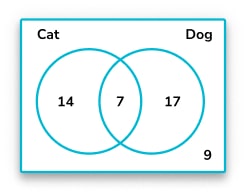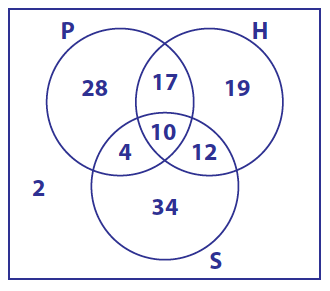A probability can be expressed in these three ways
What is a fraction, decimal, and percentage
What is 5/6
The probability of rolling a 3 on a die AND landing tails on a coin
When two events CANNOT happen at the same time
What is Mutually Exclusive
The number of people who take chemistry

What is 47
Which of these is NOT an appropriate value of a probability?
28%, 1/2, 1.7, 0.400
What is 1.7
(because probabilities are between 0 and 1)
The likelihood of getting a Queen from a regular deck of playing cards.
What is 4/52 or 1/13
When the occurrence or non occurrence of an event DOES NOT affect the likelihood of another event happening
What are independent events
The probability this spinner lands a purple or a vowel

What is 3/7
The number of people who don't like dogs

What is 23
All the possible probabilities of a sample space will add up to get this
What is 1
150 students were surveyed. 70 said they do NOT like the school lunch. Based on this, the (simplified) probability someone DOES like the school lunch.
What is 8/15
Probability of spinning a yellow then spinning a green
What is 3/64
When two events CAN happen at the same time
What is Not Mutually Exclusive
50 people ate bacon, 42 people ate pancakes, 16 people ate both. The number of people who only ate bacon.
What is 34 people
There are 2 major kinds of probabilities. One being theoretical and the other being this
What is experimental
In a cooler, 20% of drinks are coke, 15% are sprite, 35% are fanta, and 12% are root beer. The probability that you get something else.
What is 18%
For INDEPENDENT events F and G
P(F) = 1/2 ; P(G) = 44%
P(F and G) = ?
What is 22%
P(Drawing Black Jack or a Spade) [Simplified]

What is 7/26
This symbol "∪" is called union. It can also be interpreted by this word in probability.
What is "or"
This theory essentially says, as we perform more and more experiments, the experimental probability will eventually become the theoretical probability if it exists
What is the Law of Large Numbers
A roulette table has numbers 1-36 in addition to spots for 0 and 00. The probability of a number at random being a multiple of 5.

What is 7/38
There are M&Ms in a bag. 2 blue, 3 red, and 5 orange. If you eat one at a time. This is the probability of picking a blue then an orange. (Simplified answer)
What is 1/9
For MUTUALLY EXCLUSIVE events A and B,
P(A or B) = 71% ; P(A) = 38%
P(B) = ?
What is 33%
S ∩ H
What is 22
